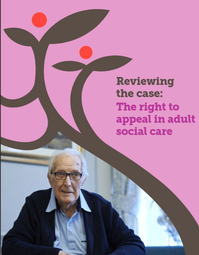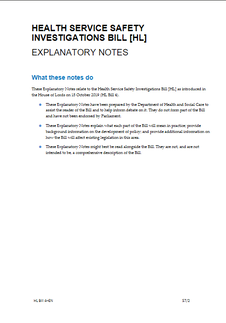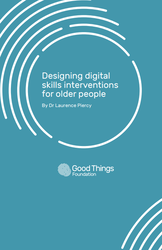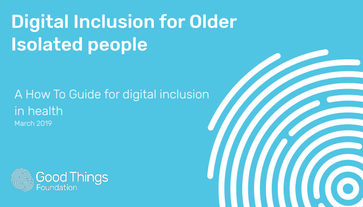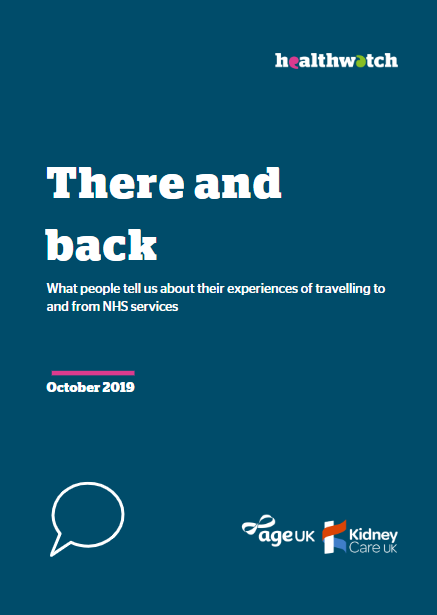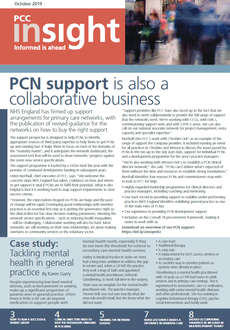NEWS - OCTOBER 2019
|
THE RIGHT TO APPEAL IN ADULT SOCIAL CARE
24 pages A report from an older people’s charity looks into how people can challenge decisions about the care and support they receive. |
PRESCRIPTIONS TO BE ISSUED ELECTRONICALLY
1 page
The electronic prescription service (EPS) helps GPs and Pharmacists prescribe and dispense medicines faster and more securely and makes it easier for patients to pick up repeat prescriptions. The EPS has been tested with 60 GP practices and hundreds of pharmacies and already accounts for almost 70% of all prescriptions.
1 page
The electronic prescription service (EPS) helps GPs and Pharmacists prescribe and dispense medicines faster and more securely and makes it easier for patients to pick up repeat prescriptions. The EPS has been tested with 60 GP practices and hundreds of pharmacies and already accounts for almost 70% of all prescriptions.
|
HL BILL 4-EN 57/2 - Explanatory Notes to New Bill
28 pages This Bill has been introduced into Parliament by the Government and proposes to establish a new Health Service Safety Investigations Body (the HSSIB) as a non-departmental public body. Attached is Parliament’s ‘explanatory notes’ and additionally, there are ‘fact sheets’ which provide more information about the Bill. These can be accessed at : https://www.gov.uk/government/publications/health-service-safety-investigations-bill--2 |
DIGITALISATION GUIDE FOR OLDER PEOPLE - NHS
A resource to help older people to make better use of IT has been published to mark Get Online Week, billed as the UK’s largest digital inclusion campaign.
A resource to help older people to make better use of IT has been published to mark Get Online Week, billed as the UK’s largest digital inclusion campaign.
CARE OF PEOPLE WITH A LEARNING DISABILITY IN GP PRACTICES
3 pages
When CQC inspect General Practices, we look at how they provide care to different groups of people.
One of these population groups is 'people whose circumstances may make them vulnerable'. This includes people with a learning disability.
According to Public Health England, about 2.5% of the population has a learning disability (LD). Yet most GP LD registers show only about 0.4% of their practice population. The ‘missing’ 2% might be people with a mild learning disability, or with other diagnoses which appear on the disease register but are not separately recorded. This includes, for example, people with Down's Syndrome, autism or cerebral palsy that also have a learning disability.
3 pages
When CQC inspect General Practices, we look at how they provide care to different groups of people.
One of these population groups is 'people whose circumstances may make them vulnerable'. This includes people with a learning disability.
According to Public Health England, about 2.5% of the population has a learning disability (LD). Yet most GP LD registers show only about 0.4% of their practice population. The ‘missing’ 2% might be people with a mild learning disability, or with other diagnoses which appear on the disease register but are not separately recorded. This includes, for example, people with Down's Syndrome, autism or cerebral palsy that also have a learning disability.
REVIEW OF PTSs
NHS England has ordered a review into the cost of patient transport services and the way they are commissioned, following a string of market failures.
Simon Stevens last week told the Healthwatch Annual Conference in Birmingham that the probe, expected to last a year, would act on concerns raised by patients.
Clinical Commissioning Groups commission the bulk of non-emergency patient transport, with Trusts sometimes organising extra capacity. However, many CCGs have been criticised for choosing the cheapest bidder, sometimes leading to poor service.
In Sussex, a company given the county-wide PTS contract withdrew from the contract in 2016 and later collapsed, owing creditors over £11m, according to papers filed at Companies House.
In neighbouring Kent and Medway, commissioners were forced to put forward additional funding after demand was substantially different to that envisaged in the contract.
In Worcestershire, West Midlands Ambulance Service Foundation Trust – which is rated “outstanding” by the Care Quality Commission – said it recently lost the non-emergency patient transport contract because it bid outside a financial cap. It added it felt the price demanded would affect the quality of the service.
Other concerns, such as failure of procurement, continue to affect the public transport landscape. In London, a transport company recently pulled a bid to supply Chelsea and Westminster FT over concerns the evaluation process was biased. The trust scrapped its procurement a month later.
‘Person-centred healthcare service’
A lead for the review has not yet been announced but NHSE said a Governance Board, involving a cross section of patient organisations, including Healthwatch England, Age Concern and Kidney Care UK, would oversee it. Mr Stevens told the Conference: “Attending hospital can be a worrying time for many patients which is why we want to make sure that their journey to and from appointments is as smooth as possible. “Building on the NHS long-term plan’s commitment to creating a person-centred healthcare service this national review of non-emergency patient transport will listen and act on concerns raised by patients.”
A Healthwatch England survey of patients earlier this year rated travel a more important issue than choice of where to be treated and improved digital access to services. Healthwatch England’s Head of Policy and Public Affairs, Jacob Lant, said the review will cover “all aspects of patient transport services,” including the transparency of local service data. The “clever use” of publicly-available data, he added, could also improve other types of patient journey. For example, appointments could be timed around local bus schedules.
Imelda Redmond, National Director of Healthwatch England, said: “Patients attending health and care services are not ‘packages to be delivered’, they are people with individual needs that must be considered as health services implement plans for care. If people are to truly be at the centre of how services are designed, then transport is a key element of how services and people’s care needs can be aligned and integrated at a local level.”
Charity Director at Age UK Caroline Abrahams added: “There are pockets of good practice across the country which we can learn and build on but the reality is that the service needs a thorough overhaul and bringing up to date so this NHS review is exactly what’s needed.”
SourceHealthwatch England announcement
NHS England has ordered a review into the cost of patient transport services and the way they are commissioned, following a string of market failures.
Simon Stevens last week told the Healthwatch Annual Conference in Birmingham that the probe, expected to last a year, would act on concerns raised by patients.
Clinical Commissioning Groups commission the bulk of non-emergency patient transport, with Trusts sometimes organising extra capacity. However, many CCGs have been criticised for choosing the cheapest bidder, sometimes leading to poor service.
In Sussex, a company given the county-wide PTS contract withdrew from the contract in 2016 and later collapsed, owing creditors over £11m, according to papers filed at Companies House.
In neighbouring Kent and Medway, commissioners were forced to put forward additional funding after demand was substantially different to that envisaged in the contract.
In Worcestershire, West Midlands Ambulance Service Foundation Trust – which is rated “outstanding” by the Care Quality Commission – said it recently lost the non-emergency patient transport contract because it bid outside a financial cap. It added it felt the price demanded would affect the quality of the service.
Other concerns, such as failure of procurement, continue to affect the public transport landscape. In London, a transport company recently pulled a bid to supply Chelsea and Westminster FT over concerns the evaluation process was biased. The trust scrapped its procurement a month later.
‘Person-centred healthcare service’
A lead for the review has not yet been announced but NHSE said a Governance Board, involving a cross section of patient organisations, including Healthwatch England, Age Concern and Kidney Care UK, would oversee it. Mr Stevens told the Conference: “Attending hospital can be a worrying time for many patients which is why we want to make sure that their journey to and from appointments is as smooth as possible. “Building on the NHS long-term plan’s commitment to creating a person-centred healthcare service this national review of non-emergency patient transport will listen and act on concerns raised by patients.”
A Healthwatch England survey of patients earlier this year rated travel a more important issue than choice of where to be treated and improved digital access to services. Healthwatch England’s Head of Policy and Public Affairs, Jacob Lant, said the review will cover “all aspects of patient transport services,” including the transparency of local service data. The “clever use” of publicly-available data, he added, could also improve other types of patient journey. For example, appointments could be timed around local bus schedules.
Imelda Redmond, National Director of Healthwatch England, said: “Patients attending health and care services are not ‘packages to be delivered’, they are people with individual needs that must be considered as health services implement plans for care. If people are to truly be at the centre of how services are designed, then transport is a key element of how services and people’s care needs can be aligned and integrated at a local level.”
Charity Director at Age UK Caroline Abrahams added: “There are pockets of good practice across the country which we can learn and build on but the reality is that the service needs a thorough overhaul and bringing up to date so this NHS review is exactly what’s needed.”
SourceHealthwatch England announcement
|
PEOPLE'S EXPERIENCES TRAVELLING TO NHS SERVICES
29 pages What people say about their experiences of travelling to and from NHS services. Healthwatch England has partnered with Age UK and Kidney Care UK, to share evidence on people's experiences travelling to NHS services. |
MEDICINES - SERIOUS SHORTAGE PROTOCOL (SSP) INTRODUCED
The Government has made use, for the first time, of a Legislation that took effect earlier this year to give Pharmacists powers to modify prescriptions.
Currently, more than 100 medicines prescribed in Primary Care are out of stock in the UK.
The Government has made use, for the first time, of a Legislation that took effect earlier this year to give Pharmacists powers to modify prescriptions.
- A 'serious shortage protocol' (SSP) has been introduced for the antidepressant fluoxetine - allowing Pharmacists to 'supply an alternative strength or pharmaceutical form' of the drug without first consulting with the original prescriber.
- The DHSC has also announced 'restrictions on the exportation of all variations of HRT products' amid supply shortages for a number of products, and put in place further restrictions for 'all adrenaline auto-injectors and hepatitis B vaccines'.
Currently, more than 100 medicines prescribed in Primary Care are out of stock in the UK.
|
PCN DEVELOPMENT
8 pages To support PCN development means considering the implications for the role of the Clinical Director, and how new roles promise new services for patients and new ways of working for Practices. |
DIGITISING LLOYD GEORGE RECORDS ... https://www.surveymonkey.co.uk/r/27NVZWL
This survey is about old, paper GP records, to find out how these records are used, and if they are important to you. It should take no longer than 10 minutes, and your answers will help inform the NHS's planning.
Introduction
Here’s some background on how GP records currently work. Please have a read, as we should like to ask you a few questions about your thoughts on this topic.
The situation
A GP record is a person’s main health record and follows them from birth to death. The records include documents such as medications, vaccinations, past illnesses and letters sent from hospitals.
For many decades these records were kept on paper, stored in files called Lloyd George envelopes. All information about a person’s ongoing care, including a summary of the paper records, is now recorded in a digital system.
Information in the paper record, which has not been entered in the digital record is not available to patients to view online.
A Practice must legally keep a person’s complete record for their lifetime or until they move to a new Practice. This includes the information in the paper and digital versions.
The problem storing all these paper records takes up a lot of space. Many Practices have rooms full of filing cabinets containing these records.
If they could be scanned and stored digitally, it could free up space in Practices for clinical use and safeguard them from a fire or flood. It might also be easier for practices to find records when they are asked for them.
Why we’d like to hear from you
The NHS has looked at how these records could be efficiently scanned and stored digitally. It is recommending that the records are scanned and held by each practice on their own digital health record systems.
The NHS has asked us to ask patients, carers and GP Practice staff if having old GP records available digitally would be useful and what concerns you might have about doing this.
This survey is about old, paper GP records, to find out how these records are used, and if they are important to you. It should take no longer than 10 minutes, and your answers will help inform the NHS's planning.
Introduction
Here’s some background on how GP records currently work. Please have a read, as we should like to ask you a few questions about your thoughts on this topic.
The situation
A GP record is a person’s main health record and follows them from birth to death. The records include documents such as medications, vaccinations, past illnesses and letters sent from hospitals.
For many decades these records were kept on paper, stored in files called Lloyd George envelopes. All information about a person’s ongoing care, including a summary of the paper records, is now recorded in a digital system.
Information in the paper record, which has not been entered in the digital record is not available to patients to view online.
A Practice must legally keep a person’s complete record for their lifetime or until they move to a new Practice. This includes the information in the paper and digital versions.
The problem storing all these paper records takes up a lot of space. Many Practices have rooms full of filing cabinets containing these records.
If they could be scanned and stored digitally, it could free up space in Practices for clinical use and safeguard them from a fire or flood. It might also be easier for practices to find records when they are asked for them.
Why we’d like to hear from you
The NHS has looked at how these records could be efficiently scanned and stored digitally. It is recommending that the records are scanned and held by each practice on their own digital health record systems.
The NHS has asked us to ask patients, carers and GP Practice staff if having old GP records available digitally would be useful and what concerns you might have about doing this.
- Patient: someone registered with a GP.
- Carer: someone who looks after a friend or family member, who needs help because of their illness, frailty or disability, and who cannot cope without their support.
- Clinician or healthcare administrator: someone currently or previously working in a general practice, or working in community healthcare linked to a GP practice.

